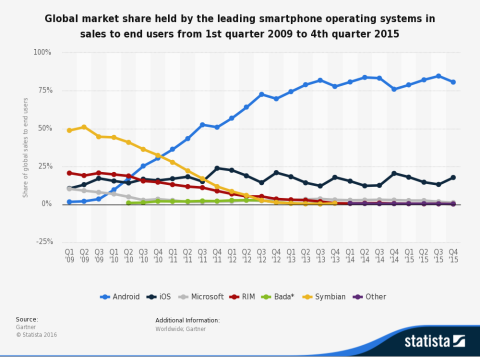Back in 2011 I switched from an iPhone to an Android device. I had owned an iPhone from its first version and I loved that phone like no other piece of technology I’ve ever owned. It was game changing in every way. I’ll never forget sitting in restaurants with my iPhone 1 (before everyone and their mother owned one) and having people walk up to me asking me what it was. Switching from an iPhone was not easy, but my basic thinking was simple – Google’s Android operating system had developed far enough that anyone deeply embedded in the Google ecosystem should consider a switch. And once a company came along to produce a hardware device that could be loaded with this software you’d have an open source system that had all of the benefits of the iPhone OS with more options and similar aesthetics.
My timing wasn’t far off as the adoption of the Android OS has clearly dominated the Apple OS over the years (via DFT):
As a heavy Google user (gmail, chrome, music, drive, photos, etc) the switch made a lot of sense for me because the Android devices sync so seamlessly. But the hardware was slower to develop than I had hoped. My original Android device, Atrix 2, was a good software device, but the hardware didn’t stack up well against the iPhone 4. And it wasn’t until several years later that the Android phones and their hardware really became comparable. Samsung’s Galaxy S, which I bought in 2012, was a great device, but it still didn’t quite match up with the hardware of the iPhone. The HTC M8, which I bought in 2014, was the first time I held an Android phone and felt like I was holding a really high quality piece of hardware. But it was still a little clunky when compared to my wife’s iPhone. I even considered going back to an iPhone until I tried the newest line of Edge phones from Samsung. It just didn’t seem like the hardware was coming along and Apple, predictably, was still producing the most aesthetically beautiful devices around.
In late 2014 I bought a new Samsung Galaxy Note Edge. It was incredible. A hardware company had finally created a phone that really compared with the iPhone. But it was still a little clunky feeling even though I felt like Samsung was getting really close to producing something greater than or equal to an iPhone. I bought a Samsung S5 in 2015 and then a Galaxy S6 Edge+ later the same year (yes, I know I’ve owned too many phones over the years). This was it. For the first time ever I had iPhone users picking up my phone saying “holy cow, what is this thing, it’s amazing?!” It reminded me of the first iPhone I ever owned. The sleek edges of the screen and its beautiful metallic/glass chassis make it one of the most aesthetically pleasing phones ever produced. The larger screen size was the perfect fit for someone who reads a lot and likes having a phone that’s got the functionality of a tablet, but the convenient size of a phone.
More recently, Samsung has released the Note 7 which I am a bit envious of. But the kicker here is that Samsung has really started to develop phones that are not only aesthetically beautiful, but are also software beasts. The two aspects that most stand out for someone like me who works in a highly regulated industry are:
- Security
- Productivity
The Note 7 is everything the smaller S7 is, but with a more functional package given its tablet like design. This is perfect for someone who writes lots of emails or reads on their phone a lot like I do. It reminds me a little bit of the old Blackberrys and how practical they were. But the Note 7 is even more practical given its large screen and compact size when compared to a tablet. It’s the ultimate productivity booster for anyone in an industry requiring high output on the go.
Equally important are the security features. The S7 and Note 7 are the most secure phones on the market. With Iris scanning and biometric authentication the phones are super secure. And Samsung’s new Knox security software has made it the most secure mobile platform on the market. In a world where privacy and security are becoming increasing concerns these features are huge advancements in mobile security. This need is even more magnified for people who work in regulated fields like finance.
I feel like I was a little early to adopt the Android platform so aggressively, but I’m glad I waited it out. Samsung has finally delivered the hardware and the software to make the wait worthwhile.
* I have a partnership agreement with Samsung Business, but all thoughts and opinions are my own and I wouldn’t recommend Samsung products if I didn’t honestly feel that they were the very highest quality Android devices on the market. For more content like this, follow Samsung Business on Insights, Twitter,LinkedIn , YouTube, and SlideShare.
Mr. Roche is the Founder and Chief Investment Officer of Discipline Funds.Discipline Funds is a low fee financial advisory firm with a focus on helping people be more disciplined with their finances.
He is also the author of Pragmatic Capitalism: What Every Investor Needs to Understand About Money and Finance, Understanding the Modern Monetary System and Understanding Modern Portfolio Construction.

